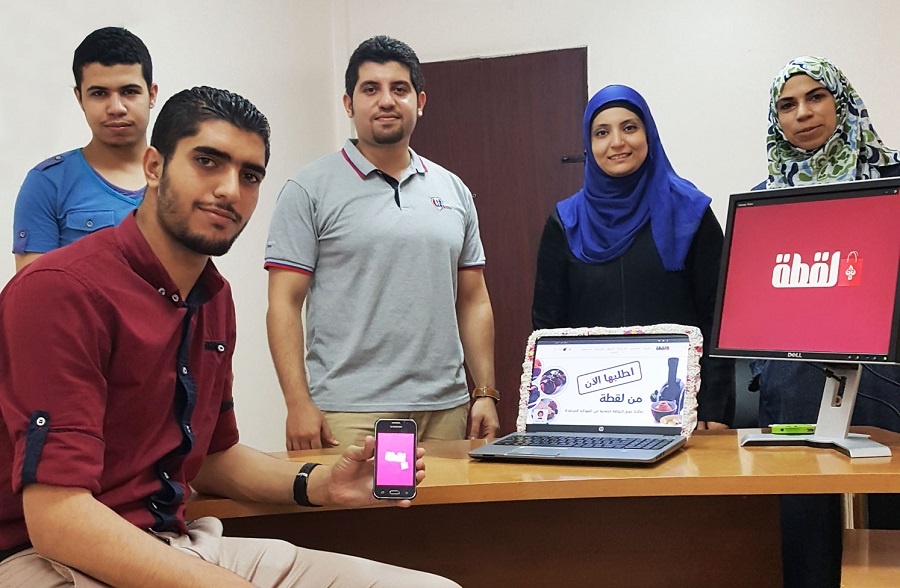It took five years for a small team of professional coders in Gaza to launch their own ecommerce solution Loqta, after noticing how much Palestinians liked to buy from social media sites rather than dedicated online shop windows.
Loqta, an Arabic slang term meaning something unique and precious, is an online marketplace for sellers - just in Gaza right now - who had previously been working from just a Facebook or Instagram page.
It targets women and offers a wide array of products from healthcare, clothing and jewelry, to accessories and electronics. The site has only been online for about five months but it is already growing in popularity; it’s received 2,000 orders so far.
Launching a successful regional e-mall was the vision that drove the parent startup Rozn and its eight-strong developer team.

The team behind Loqta, the Gaza-based ecommerce site for women. (Image via Rozn)
They realized that, after working for years with local and regional customers, they needed to pivot from developing third party websites and products to focus on creating their own ecommerce platform.
In Palestine, nearly 50 percent of households have internet access and about 75 percent of internet users are active on one or more of the social media platforms, statistics that are a catalyst for a number of Palestinian tech startups.
While there are many Palestinian startups and coding groups trying to launch successful ecommerce websites, very few have prevailed. The following are five reasons on why Loqta has succeeded where so many others have failed.
1. Solve a real problem
Loqta project manager Maha Qudwa told Wamda that her team followed a local ecommerce trend of people selling via social media pages and noted the shortcomings of this process.
”Buyers [via social media pages] often did not have faith they would receive the same good or product displayed online, and when that happened they were not able to return their items,” she said.
To solve this, the team approaches dealers directly in order to encourage them to sell their products on the Loqta site. The products are then displayed with fixed prices and with a return policy, giving each customer the freedom to test-drive the product to make sure it is what she wants.
2. Decide on who your customer is
In order to decide which market segment was best to target, the team surveyed the local market in the Gaza Strip and found that women, in most cases, were more serious about their buying decisions than men, as showed by a focus group video they made.
“Our targeted market in Gaza is estimated at 28,800 customers now, and once we have established ourselves here we are aiming to go all the way to becoming a household name in the MENA region,” Maha said.
3. Build awareness
Five percent of internet users in Palestine buy or sell online, a number that is growing but overall many people are still wary of ecommerce because of privacy or fulfillment concerns.
To overcome this, Loqta made a variety of videos and ads explaining the buying and payment processes, and noting the benefits that include returning items and payment on delivery to convince more customers to try their website.

It doesn't matter where you are these days, ecommerce
will find you. Loqta is doing its best to bring it to Gaza. (Image via
Ohmygicycle)
4. Have an edge over competition
While it’s not the first ecommerce solution in Palestine (other examples include Gaza Shop and Daleelii), Loqta’s team aims to identify and educate their target audience through the website.
These include a variety of channels to communicate with customers such as social media, providing ongoing online support, and offering to deliver the items and payment on delivery. While these elements are basics for ecommerce sites in other countries, they aren’t familiar to Gazans.
Maha said many customers and merchants had grown to trust the site, many of whom were reluctant to use an online service but were now happy Loqta users.
5. Diversify
As they move forward with Loqta as their flagship product, Rozn is still building other ecommerce and inventory management solutions for customers.
They believe this will be a safety net to cover ongoing costs and create business links that could strengthen Loqta’s core services.
Loqta is still in its infancy, but with its growing popularity and increased orders, its team believes they are on track to have a full ecommerce solution that could scale to other countries in the coming years. A mobile app is currently in the works and is to be published in a few weeks.